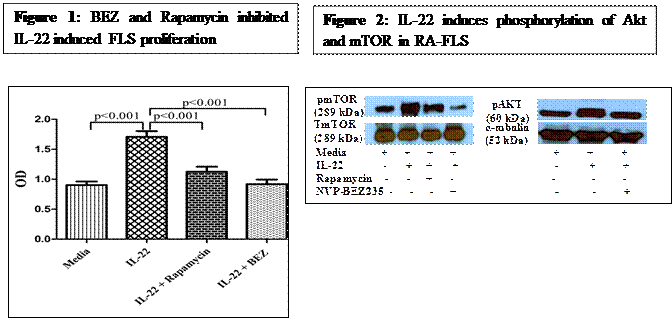Session Information
Session Type: Abstract Submissions (ACR)
Background/Purpose: IL-22, a Th17 cytokine plays a key role in the formation of “pannus” in autoimmune arthritis such as rheumatoid arthritis (RA) and psoriatic arthritis (PsA), by inducing proliferation of synovial fibroblasts (FLS) 1, 2. Among diverse functions of PI3K/Akt/mTOR signaling cascade, cell proliferation is an important one and is emerging as a potential therapeutic target for various malignant diseases. Here we are reporting that IL-22 induced FLS proliferation is PI3K/Akt/mTOR dependent.
Methods: FLS were derived from synovial tissues of PsA (n=5) and RA (n=5) patients. MTT assay in presence or absence of dual kinase (PI3K/mTOR) inhibitor, NVP-BEZ235 (BEZ) and mTOR inhibitor, Rapamycin were performed to determine the role of PI3K/Akt/mTOR in IL-22 induced FLS proliferation. Further we substantiate our findings by determining the expression of Akt/mTOR in presence or absence of IL-22, BEZ and Rapamycin with western blotting.
Results: IL-22 significantly increased proliferation of FLS (OD: 1.70 ± 0.09 vs. 0.86±0.04, p<0.0001, ANOVA) (Figure 1) derived from patients of autoimmune arthritis. Both Rapamycin and BEZ significantly inhibited IL-22 induced FLS proliferation. BEZ showed more inhibitory effect than rapamycin. In western blot, we observed that IL-22 significantly induced phosphorylation of Akt and mTOR in FLS (Figure 2). IL-22 induced phosphorylation of Akt and mTOR in FLS was significantly reduced by BEZ and Rapamycin respectively. This indicates that IL-22 induces FLS proliferation through the PI3K/Akt/mTOR pathway.
Conclusion: This is the first study showing the regulatory role of PI3K/Akt/mTOR signaling cascade in the IL-22 mediated FLS proliferation in autoimmune arthritis and thus provides a new insight in the signaling cascade of IL-22 in autoimmune arthritis.
Disclosure:
S. P. Raychaudhuri,
None;
A. Mitra,
None;
A. Datta Mitra,
None;
C. Abria,
None;
S. K. Raychaudhuri,
None.
« Back to 2012 ACR/ARHP Annual Meeting
ACR Meeting Abstracts - https://acrabstracts.org/abstract/il-22-mediated-pannus-formation-in-autoimmune-arthritis-is-pi3kaktmtor-dependent/

